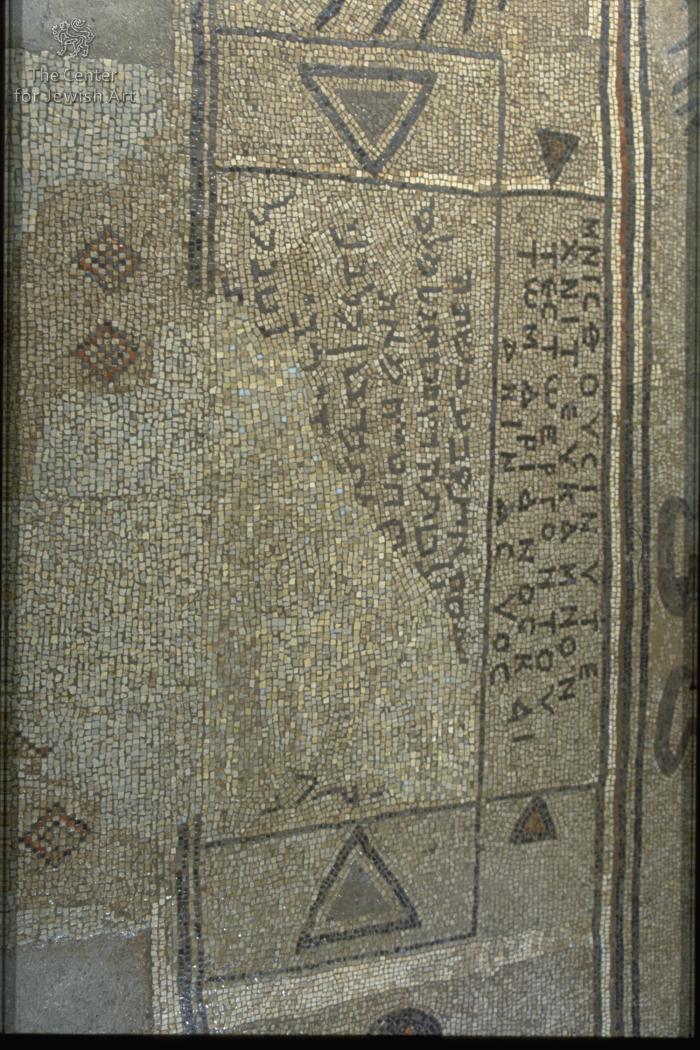Img. ID: 180

© Center for Jewish Art, Photographer: Unknown,
זכורים )לטוב( האומנים, שהוציאו לפועל את המלאכה הזאת: מריאנוס וחנינא בנו.## ]הדין פסי[פוסה אתקבע בשתה##]^^^^^^^ל[מלכותה דיוסטינוס מלכה##]סאין)?(^^^^ד[ אתנדבון כל בני## ק]רתה^^^^^^^^^[בירבי##א]^^^^^^^דכירין לטב כל##ב]ני קרתה^^^דכיר לט[ב## Next to the main entrance of the nave are two adjoining inscriptions flanked by a bull and a lion forming part of the band which framed the nave mosaics. The inscriptions are set one above the other and face the entrance. The upper inscription is in Greek, the lower in Aramaic. Each inscription is set within a differently sized tabula ansata The Greek inscription consists of five lines, separated by one line of tesserae. The translation of the inscription is as follows:## "May the craftsmen who carried out this work, Marianus and his son Hanina, be held in remembrance"## The Aramaic inscription consists of seven lines separated by three to four lines of background.The inscription reads as follows:## "This mosaic was laid down in the year ... of the reign of Emperor Justinus ... who gave a hundred dinars ... gave all members (sons) of the community(?) ... Rabbi ... honoured be the memory of all sons ... Amen.## To the left of the inscription is a lion in profile in front of a branch. Its mane is composed of curved and straight lines, its mouth is open and its tail is curled upwards. To the right is a bull in profile, its head with by two horns shaped like a horseshoe; it has a hump on its back and elongated testicles between its hind legs.
Name/Title
Beth Alpha Synagogue | Unknown
Object Detail
Nave, Inscription Mosaic Panel
Settings
Unknown
Date
518-527 (Justin I) or 567-578 (Justin II)
Synagogue active dates
Reconstruction dates
Artist/ Maker
Origin
Historical Origin
Unknown
Community type
Congregation
Unknown
Location
Site
School/Style
Unknown|
Period
Period Detail
Collection
Unknown |
Documentation / Research project
Unknown
Category
Material / Technique
The density of tesserae per 10cm2 is uniform, in the inscription as well as in the bodies and background of the animals: (8x8)-(10X10).
The colours of the tesserae in the animals, besides white and black, are dark wine red, brick red, brown, ochre, and yellow.
In both inscriptions the letters are composed of one line of black tesserae on a white background.
The colours of the tesserae in the animals, besides white and black, are dark wine red, brick red, brown, ochre, and yellow.
In both inscriptions the letters are composed of one line of black tesserae on a white background.
Material Stucture
Material Decoration
Material Bonding
Material Inscription
Material Additions
Material Cloth
Material Lining
Tesserae Arrangement
Density
Colors
Construction material
Measurements
Height
Length
Width
172 cm (Hebrew inscription)## 143 cm (Greek inscription)
Depth
Circumference
Thickness
Diameter
Weight
Axis
Panel Measurements
Subject
Unknown |
Condition
Most of the western half of the northern Aramaic inscription has been severely damaged and restored with plain white tesserae.
Extant
Documented by CJA
Surveyed by CJA
Present Usage
Present Usage Details
Condition of Building Fabric
Architectural Significance type
Historical significance: Event/Period
Historical significance: Collective Memory/Folklore
Historical significance: Person
Architectural Significance: Style
Architectural Significance: Artistic Decoration
Urban significance
Significance Rating
Textual Content
Unknown |
Languages of inscription
Unknown
Shape / Form
Unknown
0
Ornamentation
Custom
Contents
Codicology
Scribes
Script
Number of Lines
Ruling
Pricking
Quires
Catchwords
Hebrew Numeration
Blank Leaves
Direction/Location
Façade (main)
Endivances
Location of Torah Ark
Location of Apse
Location of Niche
Location of Reader's Desk
Location of Platform
Temp: Architecture Axis
Arrangement of Seats
Location of Women's Section
Direction Prayer
Direction Toward Jerusalem
Coin
Coin Series
Coin Ruler
Coin Year
Denomination
Signature
Colophon
Scribal Notes
Watermark
Hallmark
Group
Group
Group
Group
Group
Trade Mark
Binding
Decoration Program
Summary and Remarks
The Aramaic inscriptions were interpreted and translated by Joseph Naveh.
The Greek inscription was interpreted and translated by E. Sukenik.
Remarks
Suggested Reconsdivuction
History/Provenance
Main Surveys & Excavations
Bibliography
גרסון, הכתובות, 7891, עמ' 92
Avi-Yonah, Mosaic Pavements, p. 292.##Sukenik, Beth Alpha, 1932, p.38, pl.22##Naveh, On Mosaic and stone, 1978, p.71
Short Name
Full Name
Volume
Page
Type
Original
Documenter
| T.S.W. 12.1986 & H.B 3.1994, T.N., D.D. & D.S. 3.1995
Author of description
|
Architectural Drawings
|
Computer Reconstruction
|
Section Head
|
Language Editor
|
Donor
|
Object Copyright
Negative/Photo. No.
030036



